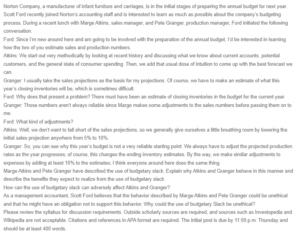Discussion – Use of Budgetary Slack
Expected Benefits of the Budgetary Slack
Atkins and Granger use budgetary slack to make sales targets that can be attained easily. One of the benefits they expect to realize from using budgetary slack is exceeding the organization’s expectations and maintaining good performance because they can control the projections to align with the organization’s expectations. The second benefit is reducing the risk of having a budget that does not adequately cover all the organization’s expenses. Atkins and Granger can also benefit by getting rewards and promotions when they use the budget slack to exceed the organization’s expectations.
The Adverse Effects of the Budgetary Slack
According to Sheng (2019), a budgetary slack increases inner costs in an organization and reduces operational efficiency. In the current case, the use of budgetary slack could make it hard for Atkins and Granger to identify issues within the budget that could affect the company’s operating costs, leading to reduced operational efficiency and an increase in operating costs. Using budgetary slack may also make it challenging for Atkins and Granger to accurately estimate the costs the company must incur to increase its performance, thus increasing the risk of reduced organizational performance. Using the budgetary slack could also reduce Atkins and Granger’s credibility, leading to job termination.
Why the use of Budgetary Slack Could be Unethical
According to Hansen et al. (2021), ethics create the foundation for the behavioral dimension of budgeting. Therefore, it is vital to ensure that all decisions made in the budget preparation process are ethical. The behavior described by Atkins and Granger is unethical because it involves sharing false data. Using budgetary slack could be unethical because it compromises the integrity of those preparing the budget and the ability to provide a reliable report. Using budgetary slack could also be unethical because it increases the likelihood of sharing misleading information with shareholders and stakeholders.
References
Hansen, D. R., Mowen, M. M., & Heitger, D. L. (2021). Cornerstones of cost management. South-Western College.
Sheng, S. (2019). Literature review on the budget slack. Proceedings of the 2019 3rd International Conference on Education, Management Science and Economics (ICEMSE 2019). https://doi.org/10.2991/icemse-19.2019.47
ORDER A PLAGIARISM-FREE PAPER HERE
We’ll write everything from scratch
Question

Discussion – Use of Budgetary Slack
Norton Company, a manufacturer of infant furniture and carriages, is in the initial stages of preparing the annual budget for next year. Scott Ford recently joined Norton’s accounting staff and is interested to learn as much as possible about the company’s budgeting process. During a recent lunch with Marge Atkins, sales manager, and Pete Granger, production manager, Ford initiated the following conversation:
Ford: Since I’m new around here and am going to be involved with the preparation of the annual budget, I’d be interested in learning how the two of you estimate sales and production numbers.
Atkins: We start out very methodically by looking at recent history and discussing what we know about current accounts, potential customers, and the general state of consumer spending. Then, we add that usual dose of intuition to come up with the best forecast we can.
Granger: I usually take the sales projections as the basis for my projections. Of course, we have to make an estimate of what this year’s closing inventories will be, which is sometimes difficult.
Ford: Why does that present a problem? There must have been an estimate of closing inventories in the budget for the current year.
Granger: Those numbers aren’t always reliable since Marge makes some adjustments to the sales numbers before passing them on to me.
Ford: What kind of adjustments?
Atkins: Well, we don’t want to fall short of the sales projections, so we generally give ourselves a little breathing room by lowering the initial sales projection anywhere from 5% to 10%.
Granger: So, you can see why this year’s budget is not a very reliable starting point. We always have to adjust the projected production rates as the year progresses; of course, this changes the ending inventory estimates. By the way, we make similar adjustments to expenses by adding at least 10% to the estimates; I think everyone around here does the same thing.
Marge Atkins and Pete Granger have described the use of budgetary slack. Explain why Atkins and Granger behave in this manner and describe the benefits they expect to realize from the use of budgetary slack.
How can the use of budgetary slack can adversely affect Atkins and Granger?
As a management accountant, Scott Ford believes that the behavior described by Marge Atkins and Pete Granger could be unethical and that he might have an obligation not to support this behavior. Why could the use of budgetary Slack be unethical?
Please review the syllabus for discussion requirements. Outside scholarly sources are required, and sources such as Investopedia and Wikipedia are not acceptable. Citations and references in APA format are required. The initial post is due by 11:59 p.m. Thursday and should be at least 400 words.


